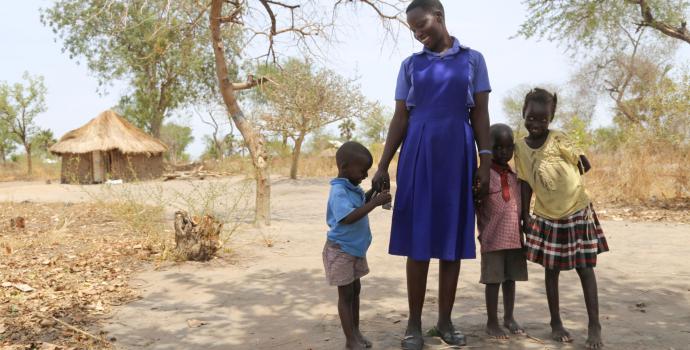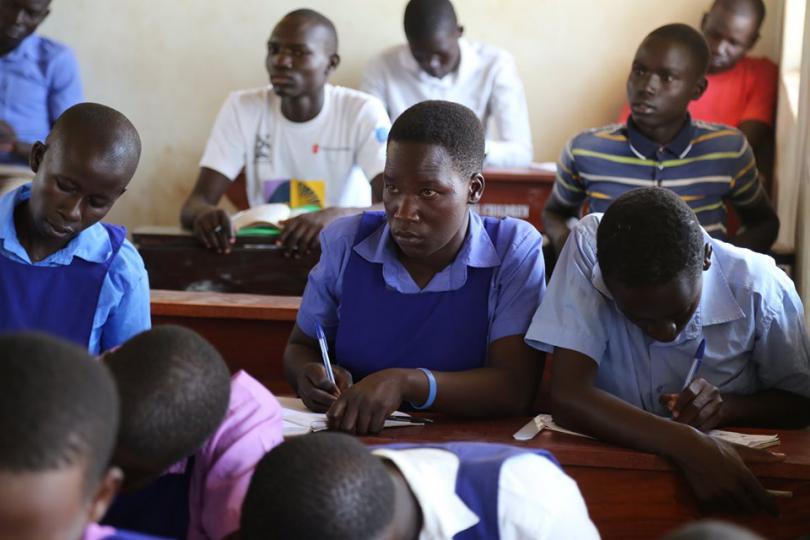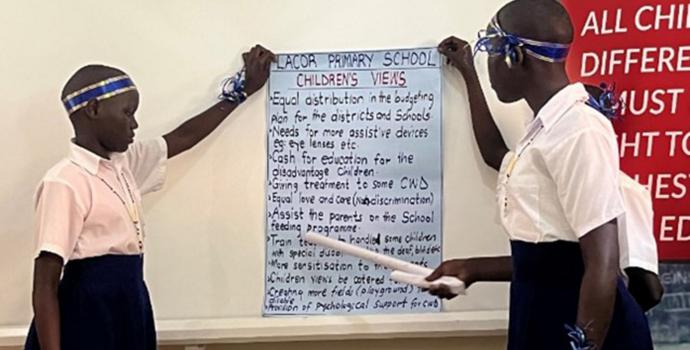A child bride gets a second chance at education

“Marriage isn’t easy. It wasn’t as nice as I thought it would be,” says Juliet, as we sit on a wooden bench outside her small hut in the vast refugee camp where she now lives with her twin boys.
Juliet was just 12 when she had to get married, and only 14 when she gave birth to twins.
In the small village in South Sudan where she grew up, marrying girls off young was a common way of trying to alleviate the financial pressures on families. Juliet’s father had died recently and her mother was struggling to make ends meet.
“Lots of my friends also got married very young,” says Juliet. “The conditions made us get married. We thought it would make life better.”
Juliet’s new husband was 24 and spent a lot of time away from the village. Left alone a lot, she made ends meet by digging cassava and groundnuts on the local farms. By 14 years old, she was pregnant and soon gave birth to beautiful twins, who she named Pious and Gerard.
Life soon got much worse. In early 2017, the war in South Sudan spread to the area and heavy fighting broke out in and around the village. Most people fled, and in the panic Juliet and her relatives were separated.
She walked for four days with the young baby twins until she reached the relative safety of the Ugandan border. “It was very difficult – it was so far to walk, and there was not enough food. We relied on a few beans,” she remembers.
Now 18, she has set up home in Palorinya, a sprawling settlement home to 100,000 refugees just a few miles across the border. She hasn’t seen her husband since she fled South Sudan. As well as her twins, Juliet has also taken two other girls into her small home – one teenage relative and a 7-year-old daughter of another relative who died.
One of the things she missed the most when she got married was school. When her father was alive she attended every day and was excelling at primary school. But after he died, her mother could no longer afford to send her and she dropped out.
Being in Uganda has given her another chance to get an education.
With humanitarian funding from the European Union, Save the Children runs an Accelerated Education Programme (AEP), targeting youth like Juliet who had to drop out of school.

The AEP runs classes specially designed for older children, using a condensed version of the Ugandan primary school curriculum. This usually takes seven years, but the AEP covers it in three. The children join the AEP at three different levels, depending on at which point they had to drop out. As many of the older learners are now parents themselves, or have more family responsibilities, AEP offers a more flexible and appropriate way for them to go back to school.
Juliet joined the Bongilo AEP centre last year. “I was told that I could join (the AEP) even though I had a baby,” she says. “I’m so happy to be back in school. Education gives me hope for the future. It helps you to provide for yourself.”
Her hope for the future is to train to be a nurse, “to help protect people from sickness, so I can stop people dying.” Sitting for her Primary Leaving Examination (PLE) at the end of this year will be a big step towards realising her dream. But for now she’s happy in Uganda: “I want to stay here because there’s no war. And I want to finish studying before I go back.”
One of her teachers, Mr Leke Emmanuel, says Juliet is a model student. “Her work is good, she’s very active in class. Children in AEP tend to be very interested in learning – often more interested than those in the normal primary schools. They’re very easy to teach because they really want to learn.”
The twins are now four years old and Juliet is keen to ensure they also get the best education they can. Every morning Juliet walks them to an Early Childhood Development (ECD) centre supported by Save the Children, where they learn basic literacy and numeracy and develop their social skills.
With a loving and ambitious mother and an early education, their difficult start to life is looking much more positive.
The EU-funded INCLUDE project is implemented together with Finn Church Aid, Norwegian Refugee Council and War Child Holland




